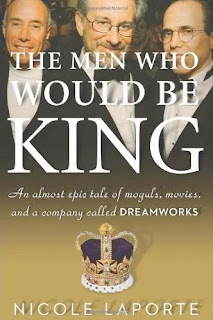DreamWorks: The Men Who Would Be King
 I've read a fair number of business books about the film industry and this is a good one. Author Nicole Laporte does an excellent job of portraying the three partners, Steven Spielberg, Jeffrey Katzenberg and David Geffen, who formed DreamWorks.
I've read a fair number of business books about the film industry and this is a good one. Author Nicole Laporte does an excellent job of portraying the three partners, Steven Spielberg, Jeffrey Katzenberg and David Geffen, who formed DreamWorks.What's clear from the book is that the company and partnership were always tenuously held together. The partners each had very different personalities and more important than that, very different goals. It's this area where the structural flaws in the company eventually caused problems.
Most companies start small and if they're lucky and well-managed, grow larger. The two words that best define DreamWorks are grandiose and hubris. DreamWorks started out large with large expectations and then systematically shrank over time. The expectations of the partners, the investment community and the public were too large and the partners, for all their money and skills, failed to live up to them.
Those interested in the animation side of DreamWorks will learn relatively little. Shrek and Sinbad, the most and least successful of the animated features, are the only ones covered in much detail. Anyone who has followed Katzenberg's career since his Disney days will have a sense of his micromanagement style and his taste in content. What surprised me is that in this book, Katzenberg comes off the best of the three partners.
David Geffen used his wealth as a weapon to intimidate others with and seemed to have a pathological need for an enemy to conspire against, whether it was Michael Ovitz, Michael Eisner, Sumner Redstone or Brad Grey.
Steven Spielberg comes off as consistently selfish, always making sure that he came out of any arrangement with what he wanted, regardless of whether it was good for DreamWorks or not. For example, on Minority Report, Spielberg made $70 million while DreamWorks only made $20 million. Spielberg was upset with Geffen for selling DreamWorks to Paramount, but had Spielberg directed more films for DreamWorks (he directed several films for other companies while a DreamWorks partner) or worried more about the company's bottom line, the sale would not have been necessary at all.
Each of the three partners also brought their own people into the company, and those people were often at odds, more concerned with protecting their relationships with their patrons than the good of the company as a whole.
In DreamWorks' defense, the media business underwent massive changes during the life of the company. In particular, Disney's purchase of ABC was the death knell for the TV division, both live and animated. However, the three large egos at the head of the company never came together on the specifics and their different agendas made it almost inevitable that the company would fracture as it did.
While this book may frustrate those only interested in the animation side of DreamWorks, The Men Who Would Be King is an excellent primer as to how politics within and between companies determine what ends up on movie screens. Unfortunately, Hollywood is a cross between high school and The Godfather, and while it can be fun to observe from a distance, I find the incessant maneuvering for status and money exhausting.


Comments
Post a Comment